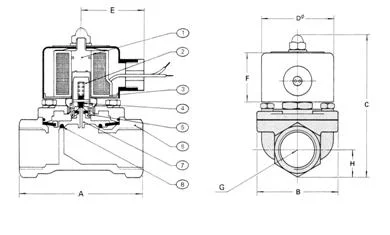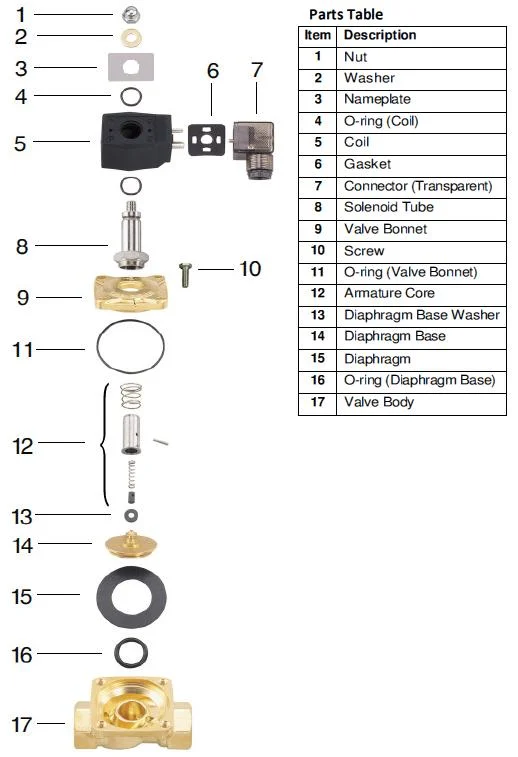Features:
Size 3/8" to 2" BSP
Function Normally Closed (power to open)
Valve Operation Coupled Diaphragm
Body Forged Brass
Seat FKM
Pressure Range 0 to 10 BAR
Media Petrochemical
A high flow valve with brass forged body and stainless steel operator. Suitable for low head and zero head applications. available in various seat materials including Viton (standard), Silicone, Neoprene, EPDM & Nitrile (contact us for any seals other than standard). Liquids to 40cst viscosity. Standard coil is weatherproof to IP65 and has LED illuminated plug. Typical Applications include: Petrochemical, diesel farms, vacuum packaging, tank drain or low pressure service & general industry. Threads conform to ISO 7.1 Sealing Threads.
*Voltages available; 12vDC, 24vDC, 24vAC, 110vAC, 240vAC, 415vAC
For Installation and Maintenance instructions please click here or find in our References section under Valve Installation and Maintenance for Solenoid Valves.

| Model | A | B | C | D | E | F | G | H | Weight Kg |
|---|---|---|---|---|---|---|---|---|---|
| B55-3-15 | 75 | 52 | 103 | 56 | 70 | 37 | 3/8 | 14.5 | 1 |
| B55-4-15 | 75 | 52 | 103 | 56 | 70 | 37 | 1/2 | 14.5 | 1 |
| B55-5-20 | 85 | 60 | 114 | 56 | 70 | 37 | 3/4 | 18 | 1.25 |
| B55-6-25 | 100 | 70 | 120 | 56 | 70 | 37 | 1 | 23 | 1.5 |
| B55-7-35 | 120 | 90 | 140 | 56 | 70 | 37 | 1-1/4 | 33 | 2.85 |
| B55-8-35 | 120 | 90 | 140 | 56 | 70 | 37 | 1-1/2 | 33 | 2.85 |
| B55-9-50 | 150 | 120 | 160 | 56 | 70 | 37 | 2 | 40.5 | 4.8 |
All dimensions in mm
.

Size 3/8" to 2" BSP
Function Normally Closed (power to open)
Valve Operation Coupled Diaphragm
Body Forged Brass
Seat FKM
Pressure Range 0 to 10 BAR
Media Petrochemical
What is a Brass Petrochemical Normally Closed Zero Differential Solenoid Valve, and what are its primary applications in petrochemical industries?
Why is brass chosen as the material for this type of solenoid valve in petrochemical applications, and what advantages does it offer?
How does a normally closed zero differential solenoid valve operate, and what role does it play in petrochemical systems?
What are some common applications where a Brass Petrochemical Normally Closed Zero Differential Solenoid Valve is typically used in petrochemical processing?
Are there any specific installation, maintenance, or safety considerations when using Brass Petrochemical Normally Closed Zero Differential Solenoid Valves in petrochemical applications?

Size 3/8" to 2" BSP
Function Normally Closed (power to open)
Valve Operation Coupled Diaphragm
Body Forged Brass
Seat FKM
Pressure Range 0 to 10 BAR
Media Petrochemical

A high flow valve with brass forged body and stainless steel operator. Suitable for low head and zero head applications. available in various seat materials including Viton (standard), Silicone, Neoprene, EPDM & Nitrile (contact us for any seals other than standard). Liquids to 40cst viscosity. Standard coil is weatherproof to IP65 and has LED illuminated plug. Typical Applications include: Petrochemical, diesel farms, vacuum packaging, tank drain or low pressure service & general industry. Threads conform to ISO 7.1 Sealing Threads.
*Voltages available; 12vDC, 24vDC, 24vAC, 110vAC, 240vAC, 415vAC
For Installation and Maintenance instructions please click here or find in our References section under Valve Installation and Maintenance for Solenoid Valves.

| Model | A | B | C | D | E | F | G | H | Weight Kg |
|---|---|---|---|---|---|---|---|---|---|
| B55-3-15 | 75 | 52 | 103 | 56 | 70 | 37 | 3/8 | 14.5 | 1 |
| B55-4-15 | 75 | 52 | 103 | 56 | 70 | 37 | 1/2 | 14.5 | 1 |
| B55-5-20 | 85 | 60 | 114 | 56 | 70 | 37 | 3/4 | 18 | 1.25 |
| B55-6-25 | 100 | 70 | 120 | 56 | 70 | 37 | 1 | 23 | 1.5 |
| B55-7-35 | 120 | 90 | 140 | 56 | 70 | 37 | 1-1/4 | 33 | 2.85 |
| B55-8-35 | 120 | 90 | 140 | 56 | 70 | 37 | 1-1/2 | 33 | 2.85 |
| B55-9-50 | 150 | 120 | 160 | 56 | 70 | 37 | 2 | 40.5 | 4.8 |
All dimensions in mm
.
